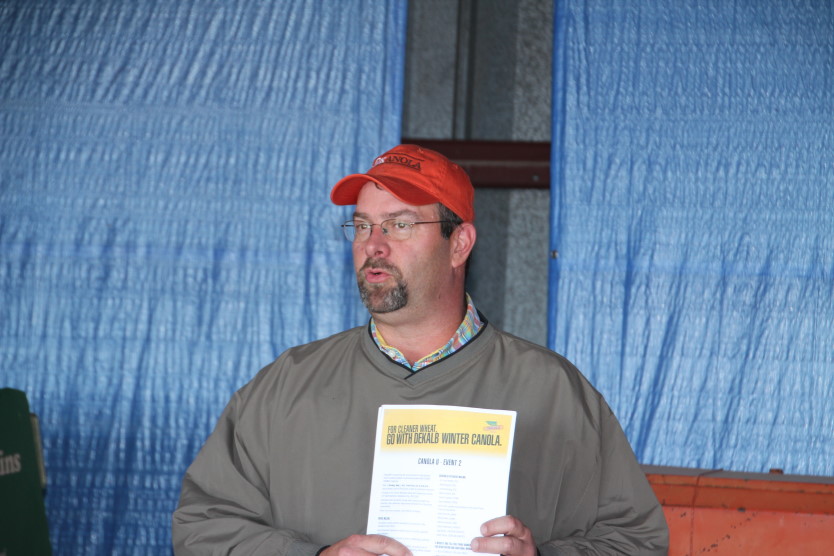
Agricultural News
Canola Producers Make the Case for DeCoupled Farm Price Supports in 2012
Tue, 13 Dec 2011 05:14:06 CST
 Pond Creek, OK farmer Jeff Scott, President of the Great Plains Canola Association (GPCA), led a delegation of winter canola farmers to Washington DC to meet with House Agriculture Committee Chairman Frank Lucas (OK-R) and other members of Congress and staff to discuss the ongoing development of the 2012 farm bill. Accompanying Scott was Matt Gard, Fairview OK and President of Plains Oilseed Products Cooperative; Bob Schrock, Kiowa KS and GPCA Vice-President, and John Haas, Larned KS, a GPCA Board member.
Pond Creek, OK farmer Jeff Scott, President of the Great Plains Canola Association (GPCA), led a delegation of winter canola farmers to Washington DC to meet with House Agriculture Committee Chairman Frank Lucas (OK-R) and other members of Congress and staff to discuss the ongoing development of the 2012 farm bill. Accompanying Scott was Matt Gard, Fairview OK and President of Plains Oilseed Products Cooperative; Bob Schrock, Kiowa KS and GPCA Vice-President, and John Haas, Larned KS, a GPCA Board member.
The Plains winter canola delegation made the trip to DC to voice their concerns and opposition to a new updated target price program under which deficiency payments would be "recoupled" to production on planted acres up to the total aggregate crop base acres of a farm, effectively reversing the planting flexibility that has been in place since the 1996 farm bill. The target price program was reportedly a component of the legislation that the agriculture committees had intended to submit to the Super Committee as agriculture's $23 billion contribution to deficit reduction before those efforts failed on November 23rd.
"Based on what we experienced back in the 1980s and 90s, it's nearly impossible to set target prices in a way that accurately reflect the value of crops over time." Jeff Scott told those he visited with on Capitol Hill. "And if prices were to decline to near or below these support levels, they would inevitably impact planting decisions."
After Scott returned from Washington- we caught up with him at this past weekend's Oklahoma Wheat Growers meeting- and you can hear our conversation about the message delivered to Washington by these canola producers by clicking on the LISTEN BAR below.
"Many producers would likely plant the crops with the highest relative target price on most if not all the base acres on a farm should prices decline, forsaking agronomically sound rotations and their benefits," stated Bob Schrock. "There is a reason we've seen winter canola grow from virtually zero to 200,000 acres in just a few short years. It's much more profitable than a mono-culture of wheat. Our wheat yields are 15 bushels higher following canola, and the wheat produced isn't discounted because it is free of dockage and foreign material."
"Our concern," added Matt Gard, "is that the loss of production during low price years would destroy the infrastructure we have painstakingly developed to support winter canola here in the Great Plains, and curtail current planned investment to support the expected acreage expansion in the future."
John Haas offered some perspective from experience. "I started farming back in the 1960s, and have farmed under all sorts of farm programs over the years. We've been there, and done that; we just can't go back to the 80s mindset where we are once again farming the program rather than following the market."
In addition to meeting with Chairman Lucas, and his committee staff, Nicole Scott, Bart Fischer, Matt Schertz, and Pelham Straughn; the group met with Anne Simmons and Craig Jagger from Ranking Member Collin Peterson's (MN-D) staff; Congressman Tim Huelskamp (KS-R) and his agriculture aide Richard Henkle; Joe Shulz from Senate Agriculture Committee Chairwoman Debbie Stabenow's (MI-D) staff; Tara Smith and Ryan Flickner from Ranking Member Pat Roberts' (KS-R) staff; as well as agriculture legislative assistants Lynn Tjeerdsma (Sen. Thune - SD, R), Jim Miller and Miles Patrie (Sen. Conrad - ND, D), Tony Eberhard and Cassie Bladow (Sen Hoeven - ND, R) and Alexis Taylor (Sen. Baucus - MT, D).
WebReadyTM Powered by WireReady® NSI
Top Agricultural News
More Headlines...



















